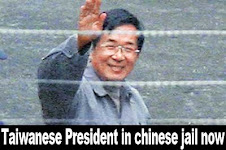 Taiwan's former president Chen Shui-bian enters a police van at the Toucheng detention center to be escorted to the district court for the first day of his formal trial on corruption charges in Taipei, Taiwan, Thursday, March 26, 2009. (AP Photo)
Taiwan's former president Chen Shui-bian enters a police van at the Toucheng detention center to be escorted to the district court for the first day of his formal trial on corruption charges in Taipei, Taiwan, Thursday, March 26, 2009. (AP Photo) Taipei, July 29 (CNA) The Taipei District Court will deliver its verdict in the corruption and money-laundering trial of former President Chen Shui-bian on Sept. 11, it announced Wednesday after holding the trial's final hearing.
Judge Tsai Shou-shun, who has been handling Chen's cases, made the announcement at around 1:30 a.m. Wednesday after presiding over a marathon 14-hour verbal debate that concluded the trial proceedings.
Tsai said the court will also announce whether Chen, who was indicted on charges of engaging in embezzlement, bribery, money laundering and forgery during his term as president from 2000 to 2008, will be released or not.
The former president has been detained since Dec. 30, 2008.
Defending himself in a closing argument that lasted more than 3 1/2 hours, Chen apologized to the country's citizens on behalf of him and his family for behavior that did not meet the highest possible moral standards.
He also called into question, as he has in the past, the behavior of former President Lee Teng-hui, former Vice President Lien Chan, People First Party Chairman James Soong and President Ma Ying-jeou.
Chen and his wife Wu Shu-jen have been charged with siphoning off NT$104 million (US$3.15 million) from a special Presidential Office discretionary fund during his term as president from 2000 to 2008.
They are also charged with accepting bribes totaling NT$300 million in connection with a land deal between the Hsinchu Science Park and Dayu Development Corp. and receiving kickbacks totaling NT$90.93 million between 2002 and 2003 to help a contractor win the tender to build the Nangang Exhibition Hall.
In addition, the couple also allegedly took bribes totaling NT$310 million from former Taipei Financial Center Corp. Chairwoman Diana Chen and former Chinatrust Financial Holdings Co. Vice Chairman Jeffrey Koo Jr.
The couple allegedly secretly stashed the funds overseas through various intermediaries, including members of their own family, all of whom have also been indicted for offenses relating to the case.
(By Deborah Kuo) Source:Central News Agency 2009-07-29 12:22 PM
Judge Tsai Shou-shun, who has been handling Chen's cases, made the announcement at around 1:30 a.m. Wednesday after presiding over a marathon 14-hour verbal debate that concluded the trial proceedings.
Tsai said the court will also announce whether Chen, who was indicted on charges of engaging in embezzlement, bribery, money laundering and forgery during his term as president from 2000 to 2008, will be released or not.
The former president has been detained since Dec. 30, 2008.
Defending himself in a closing argument that lasted more than 3 1/2 hours, Chen apologized to the country's citizens on behalf of him and his family for behavior that did not meet the highest possible moral standards.
He also called into question, as he has in the past, the behavior of former President Lee Teng-hui, former Vice President Lien Chan, People First Party Chairman James Soong and President Ma Ying-jeou.
Chen and his wife Wu Shu-jen have been charged with siphoning off NT$104 million (US$3.15 million) from a special Presidential Office discretionary fund during his term as president from 2000 to 2008.
They are also charged with accepting bribes totaling NT$300 million in connection with a land deal between the Hsinchu Science Park and Dayu Development Corp. and receiving kickbacks totaling NT$90.93 million between 2002 and 2003 to help a contractor win the tender to build the Nangang Exhibition Hall.
In addition, the couple also allegedly took bribes totaling NT$310 million from former Taipei Financial Center Corp. Chairwoman Diana Chen and former Chinatrust Financial Holdings Co. Vice Chairman Jeffrey Koo Jr.
The couple allegedly secretly stashed the funds overseas through various intermediaries, including members of their own family, all of whom have also been indicted for offenses relating to the case.
(By Deborah Kuo) Source:Central News Agency 2009-07-29 12:22 PM







